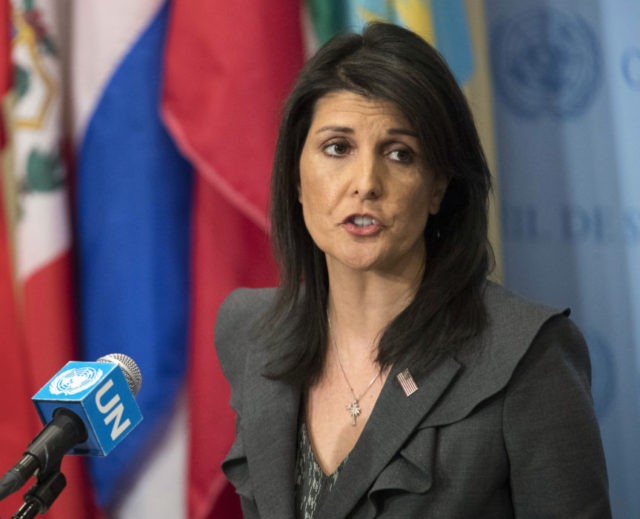TEL AVIV – U.S. Ambassador to the UN Nikki Haley slammed the United Nations Human Rights Council as being a “bully pulpit for human rights violators” and said that its controversial Agenda Item 7 is designed to undermine Israel’s existence in an interview with the Heritage Foundation in Washington on Wednesday.
She defended her country’s withdrawal from the council, saying it was the UN’s “greatest failure.”
“More often, the Human Rights Council has provided cover, not condemnation, for the world’s most inhumane regimes. It has been a bully pulpit for human rights violators,” she told the think tank.
During its attempts to reform the council the U.S. tried unsuccessfully get rid of Agenda Item 7, which mandates that alleged Israeli human rights abuses are discussed at each session.
“This is the permanent part of the Human Rights Council agenda that is devoted exclusively to Israel,” Haley told the Heritage Foundation.
“No other country — not Iran, not Syria, not North Korea — has an agenda item devoted solely to it. Agenda Item 7 is not directed at anything Israel does. It is directed at the very existence of Israel. It is a blazing red siren signaling the Human Rights Council’s political corruption and moral bankruptcy,” she said.
Prior to leaving the council, the U.S. engaged in a yearlong diplomatic campaign with more than 125 member states to discuss reforms, Haley said. “In the end, the United States couldn’t convince enough countries to stand up and declare that the Human Rights Council was no longer worthy of its name.”
The “most obvious reason is that authoritarian regimes are happy with the status quo.”
Russia, China, Cuba and Egypt and other countries “benefit from making a mockery of the Human Rights Council. So it’s no surprise that they openly resisted our efforts to reform it,” Haley said.
But she expressed her consternation that other pro-human rights democracies and NGOs also refused to cooperate with the U.S. attempts at reform.
Those NGOs “came out publicly against our reforms telling other countries to vote against us. Groups like Amnesty International and Human Rights Watch sided with Russia and China on a critical human rights issue,” Haley said.
She added, “Change is threatening to them.”
“They have big staffs and lots of relationships with the UN bureaucracy,” Haley said.
Those pro-human rights countries admitted to being “disgusted with countries like Cuba and Venezuela, Saudi Arabia and the Congo serving on the Council, as well as the constant attacks on Israel.”
“But after months of agreeing with us on all of the flaws of the Human Rights Council, they would not take a stand unless it was behind closed doors, and out of public view,” Haley said.
“Our withdrawal from the Human Rights Council does not mean that we give up our fight for reform. On the contrary, any country willing to work with us to reshape the Council need only ask,” she added. “Fixing the institutional flaws of the Human Rights Council was, is and will remain one of the biggest priorities at the UN.”

COMMENTS
Please let us know if you're having issues with commenting.